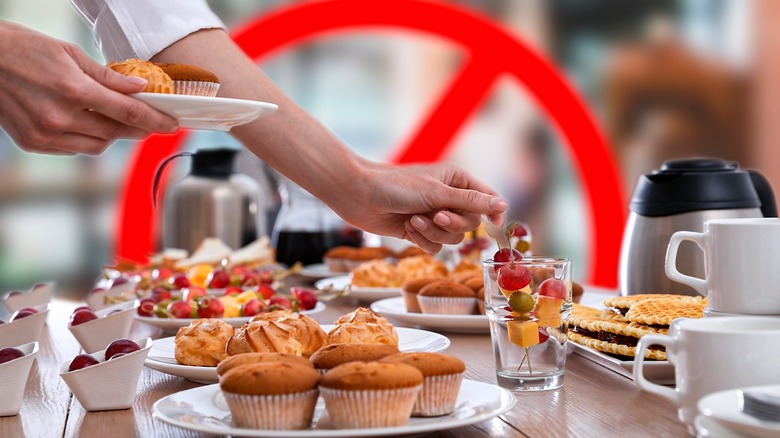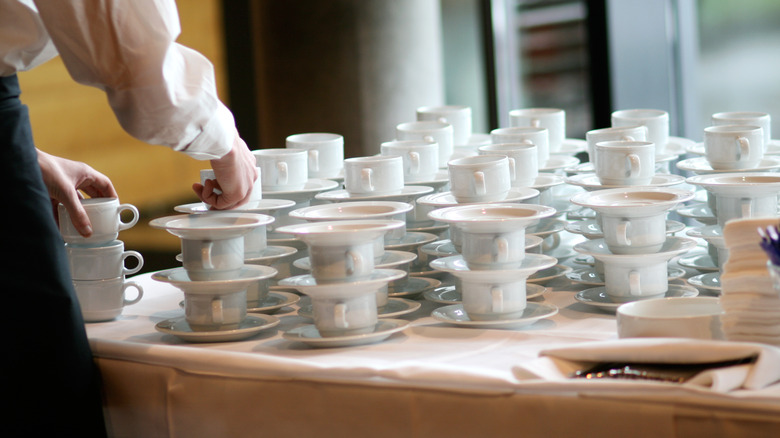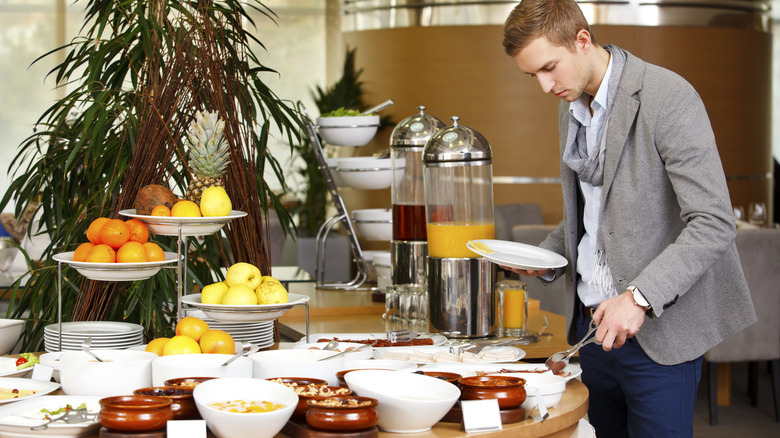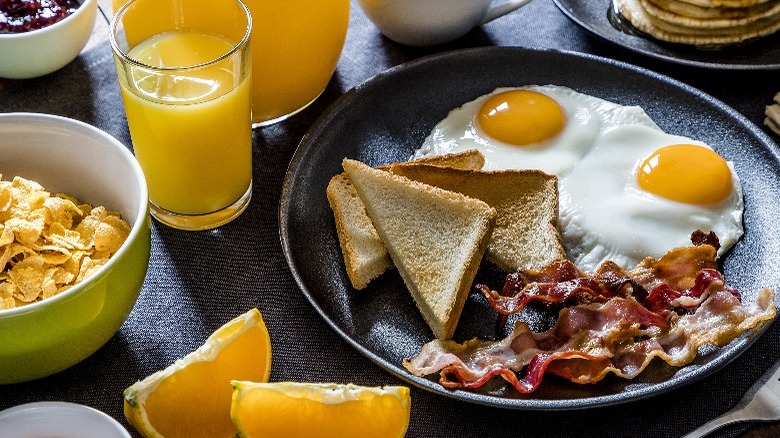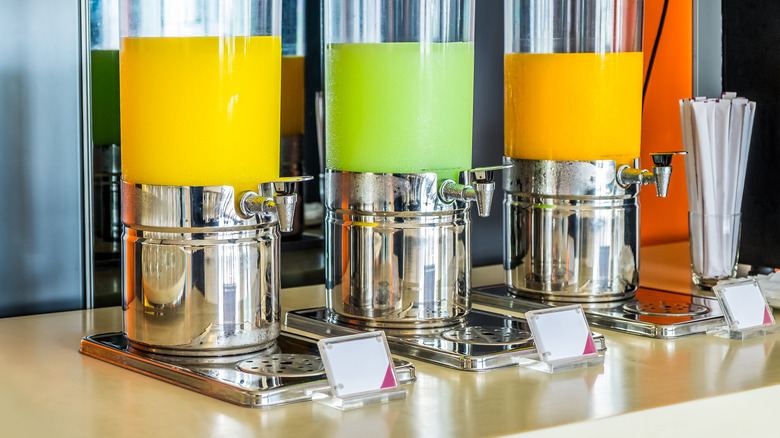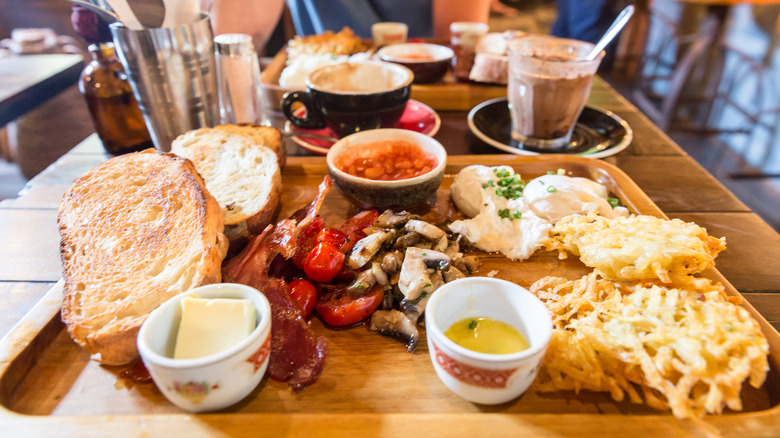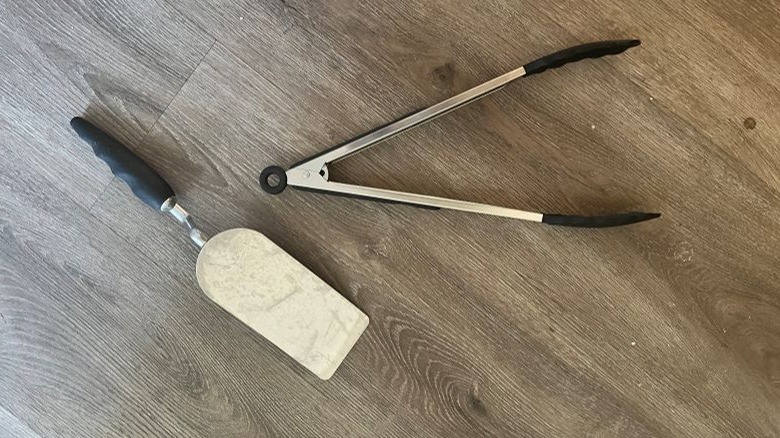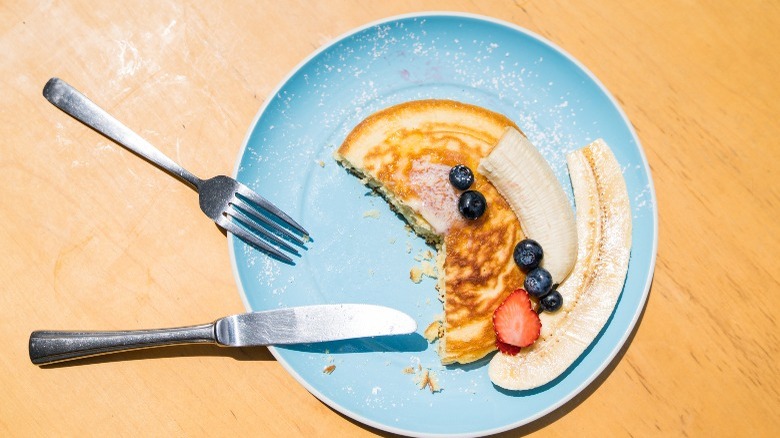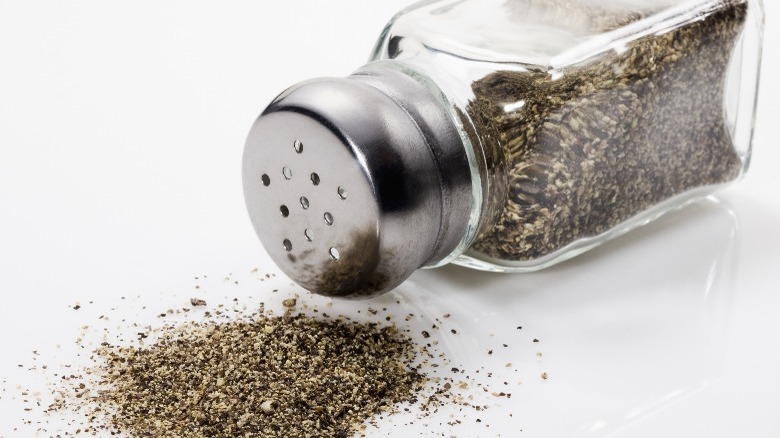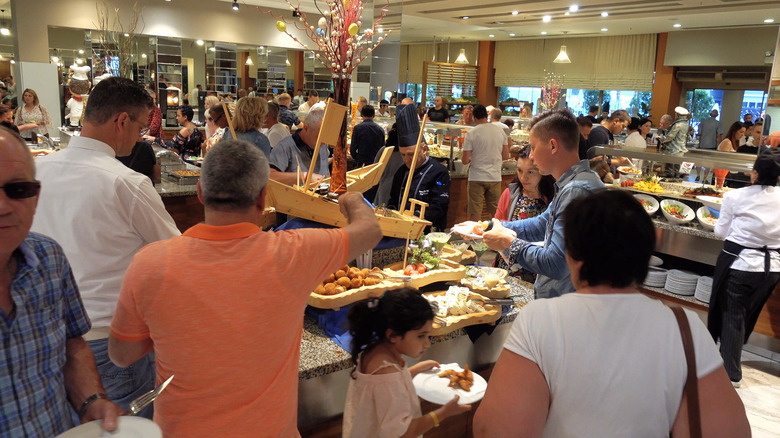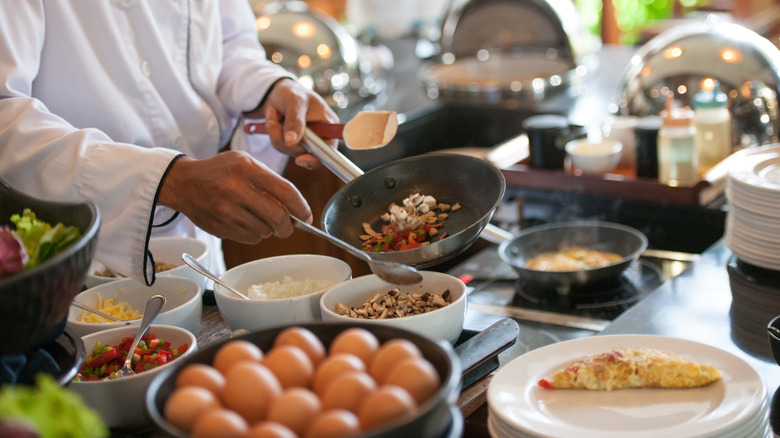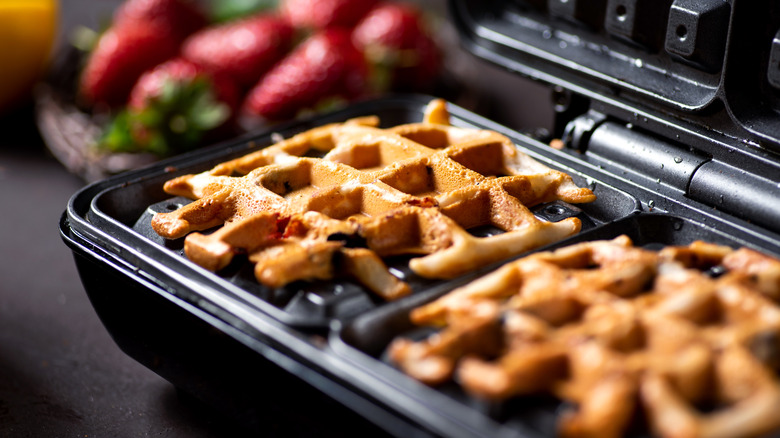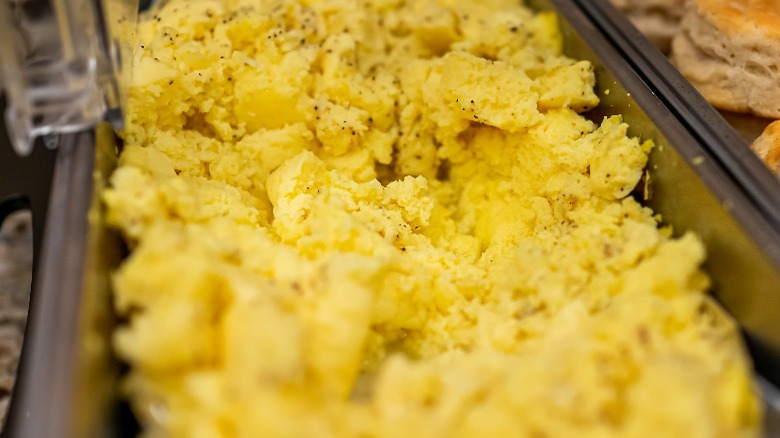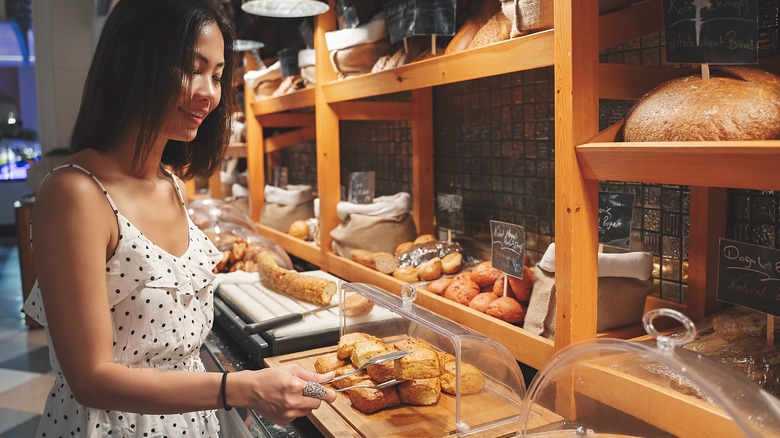17 Mistakes People Make At The Hotel Breakfast Buffet
A hotel breakfast buffet is an awesome travel perk since it's convenient, time-saving, and often included in the nightly rate. The selections can range from scrambled eggs to carved-to-order turkey breast, and some are much more elaborate than others. When you're traveling outside the U.S., the food can look unfamiliar but be well worth trying. But whether you're staying at a Holiday Inn or a fancy hotel in Europe, there are some unspoken rules that many people break about that breakfast buffet. Especially if you're on holiday, some of these pitfalls could spell ruin for your vacation — filling up on a complimentary breakfast, for instance, might wreak havoc on your digestive system if you eat the wrong foods, just as eating too much too early in the morning might limit your traveling for the rest of the day.
When booking a stay, find out if the buffet is included in the price or if there's a separate charge, because it might make sense to go a la carte when breakfast food isn't a priority. People who don't like eating large breakfasts might only want toast and coffee, but others prefer leisurely, filling breakfasts with plenty of choices. Upon arrival at your hotel, confirm the serving time with the front desk and make a reservation if necessary. Here are the major hotel buffet breakfast mistakes people make beforehand and once they're there.
1. Getting the timing wrong
If you want to take advantage of a breakfast buffet, don't show up right at opening or near closing time. It's common for lines to form at the start, but even when guests are eager to get seated, some of the stations might not be ready. Wait for the host to let people in, and if each party has to be seated, wait your turn. You may need to wait until a server arrives to get your room number. Also, keep in mind that some hotels have coffee at the buffet, while others have staff members take coffee orders at tables.
When guests need to wake up early for excursions that leave before the buffet starts, they can contact the front desk and ask about options. Oftentimes the staff provides bagged breakfasts or lunches, but people who like to sleep in should set their alarms if they want to take advantage of the breakfast buffet, too. Showing up half an hour or less before it ends might be a problem because some of the food might run out. And unless it's still being constantly replenished, whatever's left might be past its prime and you may have to settle for cold cereal.
2. Arriving in pajamas
Hotel breakfast buffets usually endorse casual, informal dress, so it's fine to arrive in T-shirts, bathing suits, and clean sweatpants. But some hotel guests show up in their jammies, and that can seem inappropriate. This is a matter of opinion, of course, but if you just rolled out of bed and go to the buffet wearing rumpled pajamas or a bathrobe, you might get some dirty looks from other guests and staff members. After all, it is a public dining room, not your kitchen.
Spa hotels might encourage guests to enjoy the breakfast buffet in their bathrobes, but if you must wear your PJs, make sure they're clean and presentable. And if you're checked into a spa hotel and show up to breakfast in your robe, please don't forget to wear slippers. Nobody wants to see your bare feet in the dining room. If you don't have time to shower before breakfast, at least comb your hair and brush your teeth. The exception to this rule is kids — they can always wear pajamas to breakfast buffets. No one's going to argue with that because it's so darn cute.
3. Not doing a first sweep
When you enter a breakfast buffet, don't fill up your plate at the first few stations. That's like walking into a shopping mall and blowing all your money on the first store you see. It's better to get an overview of the stations before making any selections. If the omelet station or juice bar are tucked off to the side, you can make room on your plate for them. Or if the breakfast spread is a little heavy on the carbs, you can plan to get some fruit or yogurt rather than piling your plate high with the pastries and pancakes at the front of the line.
Hotels vary their breakfast selections, too, so it's smart to do a first sweep every morning you attend breakfast. Before you even grab a plate, peruse the area, noting what you'll be circling back for. At a larger breakfast buffet, this is also a good time to see which stations have the longest lines so you can plan accordingly. A good strategy is to pick things like fruit, pastries, and cereals first and then set them on your table. That way, you can get in line for hot items.
4. Sticking with the usual
People who stick with a basic breakfast of cold cereal or scrambled eggs and toast can step out of the box at hotel buffets. There's no better time to try new foods and drinks, especially if the buffet is complimentary, so why pass it up? Grab a star fruit, some turkey sausage, or fresh watermelon juice and see if it pleases your palate — any of those could become part of your morning routine. Just don't take a huge portion, and don't feel bad if you don't finish a smaller one.
Experimentation is especially encouraged when traveling in other countries because you'll see a range of foods ... unless the hotel caters to American tourists. A Central American breakfast buffet might include fish and empanadas, while a German hotel breakfast buffet might have sliced meats and muesli. British or Australian breakfast spreads might include baked beans, roasted tomatoes, and bacon rolls. Keep an open mind and take advantage of any unusual items on offer, because you might be pleasantly surprised.
5. Filling up on juice
Hotel breakfast buffets usually have two or more kinds of fruit juice, and these can be worth sampling, particularly the more unusual ones. Orange and apple juice might be standard at most breakfast buffets, but some hotels might also stock cranberry or watermelon juice. While fruit juice contains important nutrients like vitamin C, unless it's freshly squeezed, it might contain added sugars. Consider that most hotels are likely to stock juice from concentrate rather than freshly squeezed — a glass or two might be fine with breakfast, but any more might flood your body with too much sugar.
Look for 100% fruit juice and consider drinking half a glass or less. Also watch out for sodas and smoothies, which can be pretty tempting. People with diabetes need to be extra careful at buffets because consuming too much of those and juice can raise blood sugar and drain energy for activities.
6. Taking huge portions
It's hard to estimate serving sizes at hotel breakfast buffets that have eggs, pancakes, bacon, and other hot food in warming trays. It's easy to scoop four or more servings in one swoop or to snag more than enough chocolate-filled croissants. And though people go to breakfast buffets on empty stomachs, they often take more than they can actually eat. It doesn't make sense to take huge portions when certain foods might not even taste that good either.
This leads to a lot of waste. If you stack your plate, the food either gets thrown away or you're going to eat too much in one sitting and possibly become sluggish or spoil your appetite for the rest of the day. A better option is to plate small portions of a variety of foods on that first pass. Feel free to head back a few more times if you still have room in your stomach, and don't be shy about it. Rest assured that everyone else is doing the same thing. Repeat trips to the buffet is a better strategy than overloaded plates and tons of leftovers that will get thrown out.
7. Dropping a serving utensil and sticking it back in the food
You wouldn't want to scoop out food with a dirty serving spoon. Rest assured, the other hotel guests wouldn't want to, either. But these utensils often get dropped on the floor at buffets, and people don't hesitate to return them to tables or into trays. Eagle-eyed staff members might step in to replace them, but there are never any guarantees. Many buffets don't even have staff members manning stations and instead opt for a simpler self-serve model.
If you drop a serving utensil on the floor, pick it up and hand it to a staff member if one is available. Or place it in the receptacle for dirty dishes and trays. You could also take it to your table and leave it there to be cleaned up. You could leave it where it fell, but another guest might return it to the original location. Also, try not to move a serving utensil from one serving tray to another unless you have no choice. And most importantly, never use your own utensils to take food out of trays.
8. Using your plate or bowl more than once
It's perfectly acceptable to use plates and bowls more than once during a meal at home, but this is poor hotel breakfast buffet etiquette. One might think that reusing things would help cut down on washing dishes, but commercial kitchens have other rules in place for important safety reasons. Sometimes, they even post signs to this effect.
The only-use-it-once mandate at buffets is in place to prevent foodborne illnesses and cross-contamination. This is because guests use the same serving utensils, which touch their plates. So if one person has a cold and a serving utensil makes contact with leftover food on their plate, the germs could spread to every other guest in the hotel who's at that buffet. Don't think that scraping away uneaten food solves the reusing problem, either. Just leave your plates, bowls, cups, and glasses on the table or in the dirty dish return when heading back to the buffet.
9. Impersonating a chef
If you think the mildly flavored hash browns in a breakfast buffet heating tray need salt and pepper and want to help out, just stop. It's fine to take a portion of hash browns, return to your table, and use the shakers there to season your food, but acting like a chef and sprinkling anything into the buffet pan for everyone else is unacceptable. This is not doing anyone any favors, since people have different palates as well as health concerns. Imagine pouring regular milk into a tray of scrambled eggs that seem dried out. Another guest could have a milk allergy and might experience a serious reaction.
So if those eggs need to be refreshed or the mixed fruit is bland, point it out to a staff member and make other selections. Hotels pay their employees to work at these buffets, and guests shouldn't have to. Taking things into your own hands in this way is unacceptable, period.
10. Drinking tons of alcohol
All-you-can-eat breakfast buffets and brunches are sometimes bottomless, so guests can also have unlimited alcoholic drinks. Two of the most popular ones are mimosas and Bloody Marys, and both can be real treats. Anyone who plans to imbibe should drink water to stay hydrated and think about using some restraint.
It's fine to enjoy a few alcoholic drinks at a breakfast buffet, but know that doing so can sap one's energy for the next few hours. Drinking too much in the morning can ruin an entire day if a guest ends up sleeping it away or falling asleep by the pool and getting sunburned. So if you want to make the most of a hotel stay, enjoy mimosas and Bloody Marys in moderation at breakfast buffets. It might be a better idea to enjoy a few drinks closer to bedtime, since you'll be able to sleep it off.
11. Hovering near other guests
Everyone likes to take advantage of hotel breakfast buffets, and this means the dining rooms can get pretty crowded. Many people have a brisk pace, but others are as slow as molasses. This can be pretty frustrating, particularly for hangry people waiting behind them. But it's poor etiquette to hover too closely or make rude comments. Not only could it lead to a confrontation, but you could also embarrass yourself.
Don't invade another hotel guest's personal space at a buffet and make an effort to be patient. And you're waiting for them to toast bread or make a waffle, know that nothing can be done to shorten the time. Get food from another area of the buffet or head back to your table for a short break. Before you know it, the slowpoke will have moved on. If the buffet seems exceptionally crowded, ask a staff member when the least busy time might be so you can plan for the next morning.
12. Not timing the omelet right
Nothing says hotel breakfast buffet like an omelet station, and this is a good way to control portion sizes and ingredients. The chef will adjust the number of eggs and ingredients according to your specifications and cook it right in front of you. These made-to-order delights usually taste fresher and better than the eggs served in warming trays.
It doesn't take that long to cook an omelet, but lines can form and wait times can be considerable. Some hotels offer guests timers that beep when their omelets are ready, but those are more an exception than the rule. Waiting in line can be aggravating, so many guests wander around or return to their tables. They might end up eating a lot of other food or going back to the station to be greeted by a cold omelet. So if the line is long, either decide to be patient or don't order one. An omelet is best when piping hot.
13. Poaching waffles and toast
Hotel guests who stick waffle batter in presses and bagels, muffins, and toast in toasters often walk away instead of hanging out their with arms folded until they hear the beep. This means that their food might sit there after it's baked until the owner returns — if they remember to. Their disappearance can put others who need to use the appliances in awkward situations, and nobody likes a long line for the waffle iron or toaster.
If a hotel guest wants to use the waffle iron or toaster but finds that it's already got a perfectly cooked, abandoned waffle or bit of toast in it, they can easily get annoyed and might resort to poaching. Stealing another guest's food is, it should go without saying, rude. It can also be humiliating if you're caught in the act, especially if the wronged guest reports you to a staff member. Don't commit a hotel breakfast buffet crime.
14. Expecting authentic scrambled eggs
Many hotel breakfast buffets have perfectly fine scrambled eggs in the warming trays, but they are undoubtedly not hand-cracked and fresh like they would be at home. A scary TikTok video showed an unnamed hotel's staff member poking up microwavable bags of precooked scrambled eggs, heating them, and putting them in serving trays. But in other cases, it might just be whisked-up liquid eggs or powdered ones mixed up with water. Feel free to sample the eggs but if the appearance, consistency, or taste isn't up to par, don't waste any plate space.
The other issue with buffet scrambled eggs is the length of time they're in the tray. Conscientious managers and staff refresh buffet items often enough, but hot foods like this can be left sitting out for too long. And room-temperature or cold scrambled eggs are pretty gross: Keep an eye on the tray, and pop over right after it's refilled.
15. Loading up on bread, rolls, and pastries
Bread, rolls, and pastries are perhaps the hardest thing to resist at hotel breakfast buffets. This is understandable because they're easy to grab and they go down so darn easy. And while some other options at a buffet may be risky — such as the scrambled eggs — you usually know what you're in for when you grab a pain au chocolat or danish. But these breakfast options are usually loaded with carbs and sugar. These treats are very filling, but only for a short while. They can raise blood sugar, and the subsequent drop in energy can leave you feeling depleted and hungry for more food sooner than later.
When considering these options at a breakfast buffet, bypass plain bread, blueberry muffins, and anything else you can get at home. Zero in on unusual selections like freshly made mango turnovers or gourmet ciabatta garlic rolls. Offer to share a few with your dining partner or just have a few bites; that way, you leave enough room for the other buffet items.
16. Eating it every day when you don't like it
Many chain hotels have been cutting costs to remain profitable, and some have slashed their breakfast buffet offerings and quality as a result. If the buffet costs extra, read some reviews to see if it's worth it — of course, you'd have to at least give it a shot if it's included in the room rate.
It's not unusual for a hotel's à la carte breakfast menu to be better than its buffet, but this isn't always true. Guests benefit from not having to wait for buffet food to be prepared, but the time saved might not be worth it. But if there's only a not-so-great buffet option, you needn't go there unless the hotel is in an isolated place with nowhere else to go. Research the area and see if there are nearby restaurants serving breakfast — there might be a great little spot within walking distance that has better food and reasonable prices. If you're already on vacation, eating at a local cafe is likely going to be a more enriching, satisfying experience than spending another few hours in your hotel.
17. Stuffing your bag with food
Contrary to what many hotel guests think, an all-you-can-eat breakfast buffet is not an all-you-can-steal event. It's common for folks to sneak in large plastic bags inside large totes and stuff them with as much food as they can hold. They think hotels make more than enough money and like the thought of getting away with something.
No one will fault you for snagging a few pieces of fruit or a muffin for the road, and this can be a big help when lunch is many hours away or if you have a long morning of activities ahead of you. Many hotels encourage guests to take coffee or tea to go as well. But filling up a snuck-in bag is poor etiquette, especially because all that food probably won't all be eaten, anyway. Not only is taking lots of food away from hotel buffets wasteful, but it also deprives everyone else of food. Take a few things if you must, but leave the rest where it belongs — on the tables for the other hotel guests.
